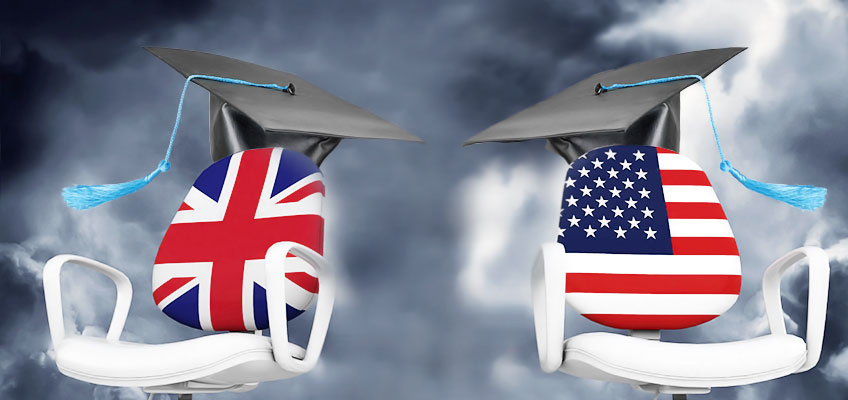
Best ACCA Institute in Dubai
March 7, 2023
Exploring the Average ACCA Salary and Job Market in Dubai
March 25, 2023MBA in UK or MBA in USA: What to Choose
Deciding whether to pursue an MBA in the UK or the USA is a highly personal decision that depends on your individual goals, preferences, and circumstances. Both countries have excellent MBA programs and offer unique benefits, so it is important to weigh the pros and cons carefully before making a decision.
Some factors to consider when deciding between an MBA in the UK or the USA include:
- Program Reputation: Consider the reputation of the business schools and MBA programs you are interested in, as well as their accreditation and rankings. Look for programs that have a strong track record of producing successful graduates and offer opportunities for networking and career advancement.
- Program Length: Consider the program length and how it fits with your career goals and personal circumstances. UK MBA programs tend to be shorter, which may be more appealing if you want to return to the workforce quickly. US MBA programs tend to be longer, which may provide more time to gain practical experience and develop a deeper understanding of business concepts.
- Program Structure: Consider the structure of the MBA program and whether it aligns with your learning preferences and career goals. UK MBA programs may have a more intensive course load, while US MBA programs may offer more flexibility and specialization options.
- Cost and Financial Aid: Consider the cost of the MBA program and whether you are eligible for financial aid or scholarships. In general, UK MBA programs tend to be less expensive than US MBA programs, but financial aid options may be more limited.
- Career Opportunities: Consider the job market and career opportunities in the UK and the USA, and whether the MBA program you choose can help you achieve your career goals in your preferred location.
Ultimately, there is no clear answer to whether an MBA in the UK or the USA is better. It depends on your individual goals and circumstances. Both countries offer excellent MBA programs and unique benefits, so it is important to research and compare programs carefully to determine which one is the best fit for you.
What is MBA in the UK?
MBA stands for Master of Business Administration, which is a postgraduate degree program that focuses on developing skills and knowledge in business management, leadership, and strategy. MBA programs in the UK are offered by a range of universities and business schools, and typically take one to two years to complete.
The MBA curriculum usually includes courses on subjects such as finance, marketing, operations management, organizational behavior, and entrepreneurship. Many MBA programs in the UK also provide opportunities for students to gain practical experience through internships or consulting projects.
Admission requirements for MBA programs in the UK may vary by institution, but typically require applicants to have an undergraduate degree and relevant work experience. Some programs may also require applicants to take standardized tests such as the GMAT or GRE.
Graduates of MBA programs in the UK may pursue a variety of career paths, such as management consulting, finance, marketing, or entrepreneurship. The MBA degree is widely recognized and respected in the business world and can provide a competitive advantage in the job market.
What is MBA in the USA?
MBA in the USA stands for Master of Business Administration, which is a postgraduate degree program that focuses on developing skills and knowledge in business management, leadership, and strategy. MBA programs in the US are offered by a range of universities and business schools, and typically take one to two years to complete.
The MBA curriculum usually includes courses on subjects such as accounting, finance, marketing, operations management, organizational behavior, and strategy. Many MBA programs in the US also provide opportunities for students to gain practical experience through internships, consulting projects, or other experiential learning opportunities.
Admission requirements for MBA programs in the US may vary by institution, but typically require applicants to have an undergraduate degree and relevant work experience. Some programs may also require applicants to take standardized tests such as the GMAT or GRE.
Graduates of MBA programs in the US may pursue a variety of career paths, such as management consulting, finance, marketing, or entrepreneurship. The MBA degree is widely recognized and respected in the business world and can provide a competitive advantage in the job market.
The Credit Difference between UK and USA MBA
The credit difference between UK and USA MBA programs can vary depending on the specific program and institution. However, here are some general differences:
- Credit System: The UK uses the European Credit Transfer and Accumulation System (ECTS), while the US uses the semester credit hour system. ECTS credits are typically calculated based on the number of contact hours a student has with a teacher or lecturer, whereas semester credit hours are based on the number of hours a student spends in a classroom or lab.
- Program Length: In general, UK MBA programs tend to be shorter than their US counterparts. Most UK MBA programs can be completed in one year, while US MBA programs usually take two years.
- Course Load: UK MBA programs typically have a more intensive course load, with students taking more courses per term than in the US. However, US MBA programs may require more credit hours overall, due to the longer program length.
- Electives: US MBA programs tend to offer a wider range of elective courses, allowing students to specialize in a particular area of business. In contrast, UK MBA programs may have a more standardized curriculum with fewer elective options.
- Work Experience: Many US MBA programs place a greater emphasis on work experience than UK MBA programs. US MBA programs may require several years of work experience as a prerequisite for admission, while UK MBA programs may accept students with less work experience.
Ultimately, the differences in credit systems and program structures reflect the different educational traditions and priorities of the UK and the US.
Benefits of UK MBA
Some potential benefits of earning an MBA in the UK include:
- Global Reputation: Many UK universities and business schools have a global reputation for excellence in business education. Earning an MBA from a highly respected institution can enhance your credibility and marketability in the job market.
- Shorter Program Length: Many UK MBA programs can be completed in one year, which means you can earn your degree and return to the workforce more quickly than in a longer program.
- Intensive Curriculum: UK MBA programs often have a more intensive course load, which can provide a more immersive and challenging learning experience. This can help you develop a deeper understanding of business concepts and gain practical skills that can be applied in the workplace.
- Networking Opportunities: UK MBA programs often attract students from diverse backgrounds and countries, which can provide valuable networking opportunities. You may have the chance to interact with business leaders, entrepreneurs, and other professionals, which can help you build relationships and expand your professional network.
- Experiential Learning Opportunities: Many UK MBA programs offer opportunities for students to gain practical experience through internships, consulting projects, or other experiential learning opportunities. This can help you develop valuable skills and gain real-world experience that can be applied in your career.
- Cultural Exposure: Studying in the UK can provide an opportunity to experience a different culture and broaden your perspectives. This can be especially valuable if you plan to work in a global business environment.
Overall, earning an MBA in the UK can provide a valuable and prestigious credential, as well as opportunities for personal and professional growth.
Benefits of USA MBA
Some potential benefits of earning an MBA in the USA include:
- Global Reputation: Many US universities and business schools have a global reputation for excellence in business education. Earning an MBA from a highly respected institution can enhance your credibility and marketability in the job market.
- Variety of Programs: The USA offers a wide range of MBA programs, including full-time, part-time, online, and executive programs, which can cater to different schedules, career goals, and learning preferences.
- Networking Opportunities: US MBA programs attract students from diverse backgrounds and countries, which can provide valuable networking opportunities. You may have the chance to interact with business leaders, entrepreneurs, and other professionals, which can help you build relationships and expand your professional network.
- Experiential Learning Opportunities: Many US MBA programs offer opportunities for students to gain practical experience through internships, consulting projects, or other experiential learning opportunities. This can help you develop valuable skills and gain real-world experience that can be applied in your career.
- Specialization Options: US MBA programs often offer a wide range of elective courses, which can allow you to specialize in a particular area of business or industry. This can help you develop expertise and differentiate yourself in the job market.
- Emphasis on Leadership: Many US MBA programs place a strong emphasis on developing leadership skills, which can be valuable for aspiring managers and executives. You may have the opportunity to participate in leadership development programs, mentorship programs, or other activities that can help you develop as a leader.
Overall, earning an MBA in the USA can provide a valuable and prestigious credential, as well as opportunities for personal and professional growth. The variety of programs and specialization options can allow you to tailor your education to your specific goals and interests, and the emphasis on leadership and experiential learning can help you develop practical skills that can be applied in the workplace.




